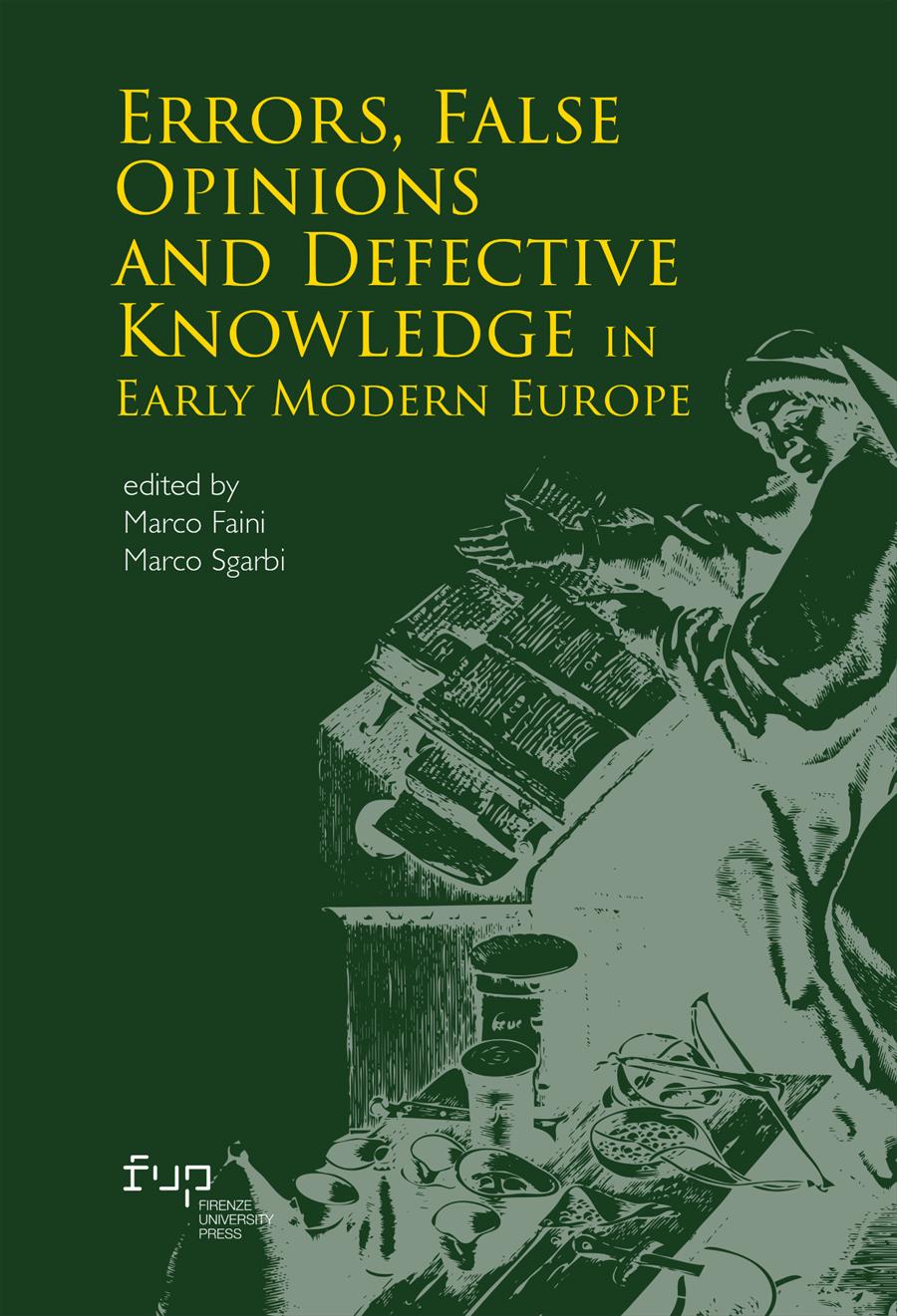- Errors, False Opinions and Defective Knowledge in Early Modern Europe
- Marco Faini, Marco Sgarbi
The Notions of Erroneous Conscience in Pierre Bayle
- Jean-Pierre Cavaillé
- © 2023 Author(s) |
- CC BY 4.0
- DOI: 10.36253/979-12-215-0266-4.08
This essay explores the reciprocal contamination of the notions of error and erring at the beginning of the early modern time in Latin and Romance languages, through the example of the concept of “erroneous conscience”. This concept, for Pierre Bayle and those who followed him at least on this point, allows for the decriminalization of religious beliefs, and even those that challenge religion(s), by recognizing the “rights of the erroneous conscience”. This right is a right to error and to erring/wandering limited to religious convictions and apparently aimed solely at “tolerance” (supporting and excusing erroneous/wandering opinions). However, it did not escape contemporaries that it radically challenged the very idea that a universal truth could be universally known and established in this field.
- Keywords:
- Erroneous conscience,
- pyrrhonism,
- moral rationalism,
- atheism,
- intolerance,
École des Hautes Études en Sciences Sociales - EHESS, France - ORCID: 0000-0002-0528-5100
- Bayle, Pierre. 1685. New Letters by the author of the General Critique of the History of Calvinism by Mr Maimbourg. A Villefranche: chez Pierre le Blanc.
- Bayle, Pierre. 1704. Addition aux Pensées Diverses […], in Pensées Diverses […]. Amsterdam: Reinier Leers.
- Bayle, Pierre. 2000. Various Thoughts on the Occasion of a Comet, ed. Robert C. Bartlett. New York: State University of New York Press.
- Bayle, Pierre. 2005. A Philosophical Commentary, ed. John Kilcullen-Chandran Kukathas. Indianapolis: Liberty Fund.
- Bayle, Pierre. 2006. De la tolérance. Commentaire philosophique, ed. J.-M. Gros. Paris: Honoré Champion.
- Brahami, Frédéric. 2001. Le travail du scepticisme: Montaigne, Bayle, Hume. Paris: Presses Universitaires de France.
- Brahami, Frédéric. 2005. “Le Dieu de Bayle est-il relativiste?,” Dix-septième siècle, 57: 135-44.
- Brown, Peter. 1964. “St. Augustine’s Attitude to Religious Coercion,” Journal of Roman Studies, 54: 107-16.
- Cantelli, Gianfranco. 1969. Teologia e ateismo. Saggio sul pensiero filosofico e religioso di Pierre Bayle. Firenze: Nuova Italia.
- de Finance, Joseph. 1974. “Sens et limites de l’objectivisme moral chez Saint Thomas: A propos du problème de la conscience erronée,” Revista Portuguesa de Filosofia, 30 (S. Tomás de Aquino e S. Boaventura: VII Centenário): 107-26.
- Furetière, Antoine. 1701. Dictionnaire universel, Seconde édition revue, corrigée et augmentée par Monsieur Basnage de Beauval. La Haye: A. et R. Leers.
- Gros, Jean-Michel. 2002. “Bayle: de la tolérance à la liberté de conscience,” in Les fondements philosophiques de la tolérance, ed. Yves-Charles Zarka-Franck Lessay-john Rogers, t. I, Études, 295-311. Paris: PUF.
- L’errance au XVIIe siècle 45e Congrès de la North American Society for Seventeenth-Century French Literature, Québec, 4 au 6 juin 2015, ed. Lucie Desjardins-Marie-Christine Pioffet-Roxanne Roy. 2017. Tübingen: Narr.
- Labrousse, Élisabeth. 1963 (2e éd. 1985). Pierre Bayle. Vol. 1: Du Pays de Foix à la cité d’Érasme. La Haye: M. Nijhoff.
- Labrousse, Élisabeth. 1964. Pierre Bayle. Vol. 2: Hétérodoxie et rigorisme. La Haye: M. Nijhoff. (2e éd., Paris, A. Michel, 1996).
- Lieber, Francis. 1859. Encyclopaedia Americana… Boston: Bazin & Ellsworth, vol. 6.
- McKenna, Antony. 2012. “Introduction,” in Pierre Bayle et la liberté de conscience, 1-15. Toulouse: Anacharsis.
- McKenna, Antony. 2018. “Pierre Bayle, les vérités évidentes et les vérités particulières,” in Libertinage et philosophie à l’époque classique (xvie-xviiie siècle), 15 (Pierre Bayle and the Libertins): 147-66.
- Mori, Gianluca. 1999. Bayle philosophe. Paris: Honoré Champion.
- Popkin, Richard H. 1979. The History of Scepticism from Erasmus to Spinoza. Berkeley: University of California Press.
- Rossell, Josep. 1660. Tractatus sive praxis deponendi conscientiam in dubiis […]. Lyon: Bordes.
- Turchetti, Mario. 1991. “La liberté de conscience et l’autorité du magistrat au lendemain de la Révocation. Aperçus du débat touchant la théologie morale et la philosophie politique des Réformés: Pierre Bayle, Noël Aubert de Versé, Pierre Jurieu, Jacques
- Vigo, Alejandro G. 2013. “La conciencia errónea. De Sócrates a Tomás de Aquino,” Signos Filosóficos, 15: 9-37.
Chapter Information
Chapter Title
The Notions of Erroneous Conscience in Pierre Bayle
Authors
Jean-Pierre Cavaillé
Language
English
DOI
10.36253/979-12-215-0266-4.08
Peer Reviewed
Publication Year
2023
Copyright Information
© 2023 Author(s)
Content License
Metadata License
Bibliographic Information
Book Title
Errors, False Opinions and Defective Knowledge in Early Modern Europe
Authors
Marco Faini, Marco Sgarbi
Peer Reviewed
Number of Pages
145
Publication Year
2023
Copyright Information
© 2023 Author(s)
Content License
Metadata License
Publisher Name
Firenze University Press
DOI
10.36253/979-12-215-0266-4
ISBN Print
979-12-215-0265-7
eISBN (pdf)
979-12-215-0266-4
eISBN (epub)
979-12-215-0267-1
Series Title
Knowledge and its Histories
Series ISSN
3035-5974
Series E-ISSN
3035-5923
